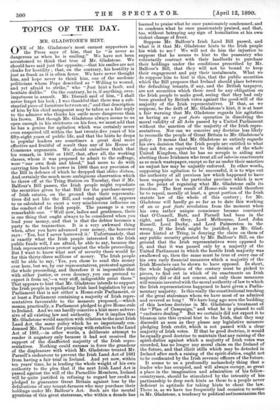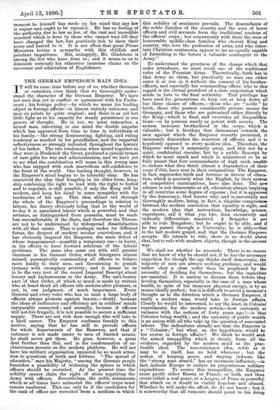TOPICS OF THE DAY.
MR. GLADSTONE'S HINT.
ONE of Mr. Gladstone's most earnest supporters in the Press says of him, that he "is never so dangerous as when he is smiling." We have not been accustomed to think that true of Mr. Gladstone. We should have said just the opposite,—that his smiles are not cloaks for hostility ; that, on the contrary, his hostility is just as frank as it is often fierce. We have never thought him, and hope never to think him, one of the sardonic politicians whom Pope described as "Willing to wound, and yet afraid to strike," who "Just hint a fault, and hesitate dislike." On the contrary, he is, if anything, over- impetuous in assault. Mr. Disraeli said of him, "I shall never forget his look ; I was thankful that there was a sub- stantial piece of furniture between us ;" and that description of him by his chief antagonist may be taken as a fair reply to the admirer who thinks his smile more dangerous than his frown. But though Mr. Gladstone always seems to us open enough in his strictures on his foes, we must add that he has a genius for agitation which was certainly never even suspected till within the last twenty-five years of his fifty-eight years of public life, and that the hints he drops to popular leaders are sometimes a great deal more effective and fruitful of result than any of his House of Commons arguments. We should ourselves think that his remark, in 1866 or 1867, that, after all, the working classes, whom it was proposed to admit to the suffrage, were "our own flesh and blood," had more to do with carrying him back to power in 1868 than any provision of the Bill in defence of which he dropped that obiter dictum. And certainly the much more ambiguous observation which he threw off at the Tring Station on Tuesday, that if Mr. Balfour's Bill passes, the Irish people might repudiate the securities given by that Bill for the purchase-money of Irish estates, on the ground that their representa- tives did not like the Bill, and voted against it, appears to us calculated to exert a very mischievous influence on the conduct of the Irish people. The passage is a very remarkable one. "Well now, ladies and gentlemen, there is one thing that ought always to be considered when you lend your money, and that is that the debtor becomes a party to the transaction. It is a very awkward thing when, after you have advanced your money, the borrower says : Yes, but I never borrowed it.' Unfortunately, that is exactly what the Irish people interested in the Irish public funds will, I am afraid, be able to say, because the Irish representatives protest against the whole proceeding. But I want to know what sort of security there would be for this thirty-three millions of money. The Irish people will be able to say, Yes, you chose to send this money over here, but we, by our representatives, protested against the whole proceeding, and therefore it is impossible that with either justice, or even decency, you can pretend to expect it from us,'—a very stiff, indigestible point there." That appears to hint that Mr. Gladstone intends to support the Irish people in repudiating Irish land legislation by any Parliament that is not either a Home-rule Parliament, or at least a Parliament containing a majority of Irish repre- sentatives favourable to the measure proposed,—which means, practically, a Parliament pledged to give Home-rule to Ireland. And we can hardly conceive a hint more subver- sive of all existing law and authority. For it implies that Mr. Gladstone would sanction with relation to the next Irish Land Act, the same policy which he so imperiously con- demned Mr. Parnell for pursuing with relation to the Land Act of 1881,—in other words, a deliberate attempt to render it nugatory only because it had not received the support of the disaffected majority of the Irish repre- sentatives. Nothing could surpass in force the grandeur of the displeasure with which Mr. Gladstone treated Mr. Parnell's endeavour to prevent the Irish Land Act of 1881 from having a fair trial in Ireland. And yet now, within ten years' time, he is lending the whole weight of his own authority to the plea that if the next Irish Land Act is passed against the will of the Parnellite Members, Ireland will be quite justified in refusing to regard her credit as pledged to guarantee Great Britain against loss by the defalcations of any tenant-farmers who may purchase their holdings under Mr. Balfour's Act. Such are the mental grations of this great statesman, TAW Within a decade has learned to praise what he once passionately condemned, and to condemn what he once passionately praised, and that, too, without betraying any sign of humiliation at his own violent change of front.
Suppose Mr. Balfour's Irish Land Bill passed, and what is it that Mr. Gladstone hints to the Irish people his wish to see ? We will not do him the injustice to suppose that he means to hint to the peasantry who voluntarily contract with their landlords to purchase their holdings under the conditions prescribed by Mr.. Balfour's Bill, that they will not be bound to keep their engagement and pay their instalments. What we do suppose him to hint is this, that the public securities. which the Bill proposes that Ireland should place between the defaulting tenants, if any, and the British taxpayer, are not securities which there need be any obligation on the Irish people to make good, seeing that they had only been granted by British votes against the good-will of the majority of the Irish representatives. If that, as we suppose, be the drift of Mr. Gladstone's hint, it is at least a fair warning that Mr. Gladstone regards his agitation as having an ex post facto operation in dissolving the moral validity of all Acts passed by a United Parliament without the sanction of the majority of the Irish repre- sentatives. Nor can we conceive any doctrine less likely to reconcile the people of Great Britain to Mr. Gladstone's policy. It means that Mr. Gladstone so entirely regards his own decision that the Irish people are entitled to what they ask for, as equivalent to the decision of the whole United Kingdom, that he has no scruple in aiding and abetting those Irishmen who treat all ad interim enactments as so much wastepaper, except so far as under their sanction an unjust law may be unjustly enforced. In other words, supposing his agitation to be successful, it is to wipe out the authority of all previous law which happened to have- been unpopular in the particular province which is now on the point of regaining what Mr. Gladstone calls its. freedom. The first result of Home-rule would therefore be to repeal, morally at least, a great portion of the Irish statute law of the whole of this century ; for Mr.. Gladstone will hardly go so far as to date this working of an ex post facto revolution from the moment when his own rather unique conscience became convinced that O'Connell, Butt, and Parnell had been in the right, and Lord Grey, Lord Melbourne, Lord John Russell, Lord Derby, and Lord Palmerston in the wrong. If the Irish might be justified, as Mr. Glad- stone hinted at Tring, in denying the claim on them of any public security granted by Mr. Balfour's Bill, on the ground that the Irish representatives were opposed to it, and that it was passed only by a majority of the United Parliament in which the hostile Irish majority was swallowed up, then the same must be true of every one of his own early financial measures which a majority of the Irish Members can be shown to have opposed. In short, the whole legislation of the century must be picked to pieces, to find out in which of its enactments an Irish majority did or did not concur, and only those measures will remain invested with the moral authority of law to which the Irish representatives happened to have given a Parlia- mentary majority. Is this really the constitutional teaching of the great statesman whom we have most of us admired and revered so long ? We have long ago seen the budding of this lawless doctrine in Mr. Gladstone's treatment of the "Plan of Campaign," and what he is pleased to call "exclusive dealing." But we certainly did not expect it to blossom into this cynical hint to the Irish, that they may discredit as soon as they please any legislative measure pledging Irish credit, which is not passed with a clear majority of Irish votes. If that be good doctrine, it would be equally good doctrine to maintain that any raising of the spirit-duties against which a majority of Irish votes was recorded, has no longer any moral claim on the Ireland of the future, and that illicit stills which may be detected in Ireland after such a raising of the spirit-duties, ought not to be confiscated by the Irish revenue officers of the future. It seems to us a profoundly melancholy thing that Eu leader who has occupied, and will always occupy, so great a place in the imagination and admiration of his fellow- countrymen, should be stimulated by the intensity of his partisanship to drop such hints as these to a people never deficient in aptitude for taking hints to cheat the law. There is, as we have too frequently had occasion to notice in Mr. Gladstone, a tendency to political antinomianism the moment he himself has made up his mind that any law is unjust and ought to be repealed. He has no feeling of the authority due to law as law, of the vast and incredible mischief which is done by those who cannot wait till they have changed the law, but positively itch to show their scorn and hatred to it. It is not often that great Prime Ministers betray a sympathy with this childish and petulant impatience. But, unhappily, Mr. Gladstone is among the few who have done so ; and it seems to us to diminish seriously his otherwise immense claims on the reverence and. admiration of Englishmen.



































 Previous page
Previous page